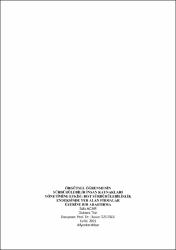Örgütsel öğrenmenin sürdürülebilir insan kaynakları yönetimine etkisi: bıst sürdürülebilirlik endeksinde yer alan firmalar üzerine bir araştırma
Özet
İşletmeler için insan kaynakları, önemli rekabet avantajlarından birisidir. Kritik insan kaynaklarının işletmeye kazandırılması ve elde tutulması sayesinde işletmelerin sahip oldukları rekabet avantajı artmaktadır. Ancak işletmelerin karşılaştıkları çevresel belirsizlik sebebiyle diğer kaynaklar kadar insan kaynakları da etkilenmektedir. İşletmeler, örgütsel öğrenme sürecinde çevresel belirsizlik ile mücadelede önemli katkılar elde etmektedir. Bu sebeple insan kaynakları yönetiminin sürdürülebilirliğinin sağlanmasında çevresel belirsizlik ile mücadele de örgütsel öğrenme önemli bir katkı olarak düşünülmektedir.
Bu çalışma örgütsel öğrenmenin, işletmelerde uygulanan sürdürülebilir İKY uygulamalarına etkisini incelemek amacıyla hazırlanmıştır. Bu amaç doğrultusunda BİST sürdürülebilir endeksinde yer alan 58 firmada insan kaynakları uzmanı olarak çalışan 132 çalışanın katılımıyla nicel bir çalışma gerçekleştirilmiştir. Katılımcılardan elde edilen veriler korelasyon, regresyon, t testi ve ANOVA testlerine tabi tutularak örgütsel öğrenme ve sürdürülebilir İKY arasındaki ilişki, örgütsel öğrenmenin sürdürülebilir İKY üzerindeki etkisi ve demografik değişkenlerin sürdürülebilir İKY algısındaki etkisi tespit edilmek istenmiştir.
Elde edilen bulgulara göre, sürdürülebilir İKY alt faktörlerinden çalışma koşulları, çalışan gelişimi ve mutluluğu alt faktörünü, işletme içi bilgi paylaşımı alt faktörünün, çevreye duyarlılık alt faktörünü ise öğrenmeye olan kararlılık alt faktörünün anlamlı ve pozitif yönde etkilediği, aynı zamanda çalışma koşulları, çalışan gelişimi ve mutluluğu alt faktörünü açık fikirlilik alt faktörü, çevreye duyarlılık alt faktörünü ise paylaşılan vizyon alt faktörü anlamlı ve negatif yönde etkilediği görülmüştür. Değişkenlerin sürdürülebilir İKY algısı üzerindeki etkilerine bakıldığında, esneklik uygulamalarının algısının üzerinde yaş faktörünün etkisinin olduğu, kağıtsız-dijital süreçler alt faktörünün algısının üzerinde ise yaş ve eğitim değişkenlerinin etkisinin olduğu sonucuna ulaşılmıştır. Sonuç olarak, örgütsel öğrenme ile sürdürülebilir insan kaynakları yönetimi arasında zayıf bir ilişkinin olduğu sonucuna ulaşılmıştır. Human resources for businesses are one of the important competitive advantages. Thanks to the acquisition and retention of critical human resources, the competitive advantage of enterprises increases. However, due to the environmental uncertainty faced by businesses, human resources are affected as much as other resources. Businesses make significant contributions to the fight against environmental uncertainty in the organizational learning process. For this reason, organizational learning is considered as an important contribution to combating environmental uncertainty in ensuring the sustainability of human resources management.
This study was prepared to examine the effect of organizational learning on sustainable HRM practices applied in businesses. For this purpose, a quantitative study was conducted with the participation of 132 employees working as human resources specialists in 58 companies included in the BIST sustainable index. The data obtained from the participants were subjected to correlation, regression, t-test and ANOVA tests to determine the relationship between organizational learning and sustainable HRM, the effect of organizational learning on sustainable HRM and the effect of demographic variables on the perception of sustainable HRM.
According to the findings obtained, the sub-factors of sustainable HRM, working conditions, employee development and happiness sub-factor, in-house knowledge sharing sub-factor, environmental sensitivity sub-factor and determination to learn sub-factor significantly and positively affect, at the same time, working conditions, employee development and It was seen that the happiness sub-factor was affected by the open-mindedness sub-factor and the environmental sensitivity sub-factor was significantly and negatively affected by the shared vision sub-factor. Considering the effects of the variables on the perception of sustainable HRM, it was concluded that the age factor had an effect on the perception of flexibility practices, while the age and education variables had an effect on the perception of the paperless-digital processes sub-factor. As a result, it was concluded that there is a weak relationship between organizational learning and sustainable human resource management.



















